Mahi Pono: Five Years of Planting
Alfredo G. Evangelista | Assistant Editor | All Photos Courtesy Mahi Pono
Quick question. What do Costco, Target, Whole Foods, Foodland, Pukalani Superette, Takamiya Market and Tamura’s (and other local retailers) have in common? If you answered you can find Mahi Pono products (limes, lemons, onions and watermelons through its brand Maui Harvest) at these retail stores, you are correct.
Five years (December 2018) have passed since Mahi Pono purchased some 41,000 acres of former H.C.&S. sugar cane land from Alexander & Baldwin. (Two years before, on Jan. 6, 2016, A&B announced it was closing the Pu‘unënë mill which employed 675 at that time. The final sugar harvest ended on Dec. 12, 2016, closing the sugar plantation era in Hawai‘i.)
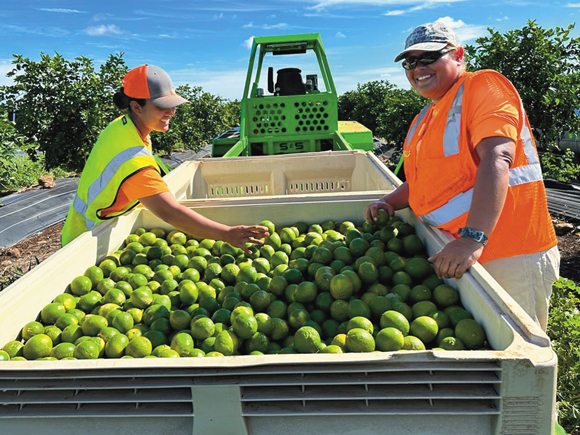
Mahi Pono now has 350 full-time employees who are Maui residents, with a number of them veterans of HC&S farming operations.
Maui resident and current Chief Operating Officer Shan Tsutsui says “Our primary crops consist of limes, lemons, oranges, tangerines, coffee, avocado, macadamia nuts, onions and watermelons.” Tsutsui added many of Mahi Pono’s crops were still growing.
“As of December 31, 2023, we have planted approximately 10,500 acres of land with crops,” Tsutsui describes. “We also have about 9,000 acres in active cattle ranching operations. We have only owned the property for five years and we are proud of the progress we have made in this relatively short time. Going forward, we will continue to turn fallow former sugar cane fields into more planted acres of diversified agriculture.”
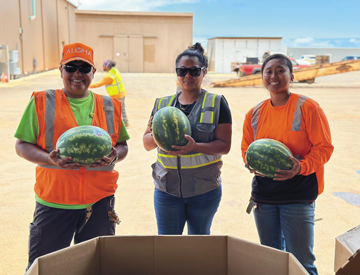
The company’s website, www.MahiPono.com outlines the company’s plans for future crops. A map at www.mahipono.com/facts-and-figures is helpful to see what has been planted and what is planned for the future.
Tsutsui more often than not shows up to work in blue jeans, work boots and a polo work shirt—a far cry from the aloha shirts and coats and ties that made up his wardrobe as a financial advisor, a State Senator and then as Lt. Governor. He thinks of himself as a farmer now and dresses appropriately. Tsutsui, who initially began as Mahi Pono’s Senior Vice President of Operations, became COO in December 2020. Tsutsui’s position “oversees the business functions of the company, including government relations, community outreach, business development, human resources and legal representation.”
Tsutsui has proven an almost perfect fit as Mahi Pono, which not only purchased the land but also A&B’s interest in the East Maui Irrigation system. “One of the primary goals of the Mahi Pono farming operations is to make sure water is used efficiently,” he explains. “We have made significant investments to install brand new timed and targeted systems in all our planted fields. The result is an on-farm irrigation system that is much more efficient than the systems that it replaced.”
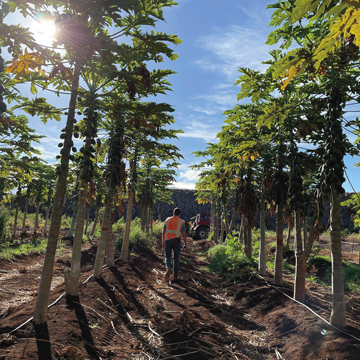
The diversion of water by A&B for sugar was a divisive issue for decades and remains a challenge politically and practically. As farmers are acutely aware, water is necessary for farming and most of the Maui central plain formerly used for sugar plantings remain dependent on water from outside the region. “From an operational standpoint, we do need water to farm,” observes Tsutsui. “EMI diverts surface water from East Maui through the EMI ditch system under a one-year permit that EMI obtains every year from the State Board of Land & Natural Resources. EMI then delivers that water to the Mahi Pono farm.”
“We also acknowledge the cultural importance of water as a natural resource, and to that end, we are compliant—and will remain compliant—with the in-stream flow standards set by the State in 2018,” Tsutsui emphasizes.
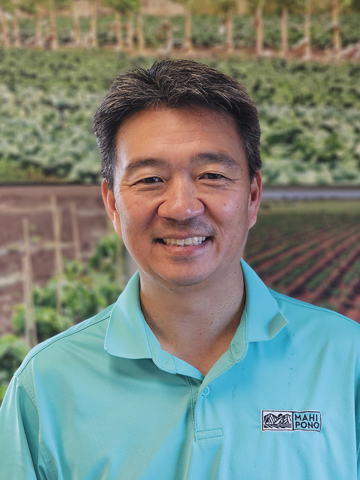
But Mahi Pono’s head notes the difficulty in planning when the availability of water is year-to-year. “EMI is also pursuing a long-term lease from the State of Hawai‘i. An Environmental Impact Statement for a long-term water lease was successfully filed and accepted in 2021. That pursuit is still ongoing.”
Knowing it takes a team to succeed, Tsutsui lauded Mahi Pono’s employees. “I think the highest successes have been the team that we have built thus far, and the amount of planting progress that the team has achieved. To have turned more than 10,000 acres of fallow sugarcane land into 10,000 acres of planted diversified agriculture has been a huge undertaking. The team deserves a ton of credit for all the work they have put in thus far. That said, we are not done yet. We are continuing to push forward, one step at a time.”
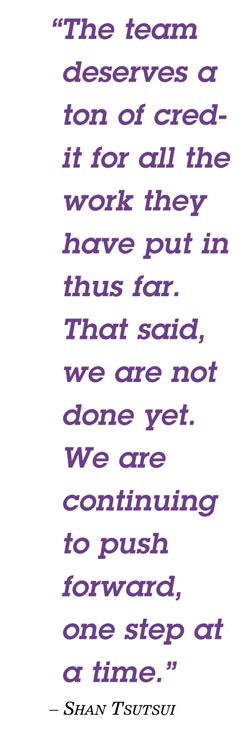
Tsutsui expanded on the complexity of farming. “Every day brings a new challenge. I think that is something inherent in farming and agriculture in general. Although there are farming-specific challenges that affect our operation, other general conditions like weather, housing prices, economic changes, emergency situations, and natural disasters have also affected how we operate. Like every other business, we try our best to adapt and move forward.”
Part of Mahi Pono’s goals was to grow food for local consumption. “One of our first crops was red, white and yellow potatoes. A tremendous number of potatoes are imported into the State and we wanted to offset those imports to a degree by growing potatoes here,” Tsutsui says. “We did encounter some difficulty with harvesting those potatoes without cosmetically damaging the potatoes’ thin skin. We plan on revisiting potatoes as a crop in the near future but we may pick varieties that have a thicker skin to enable a simpler harvesting process.”
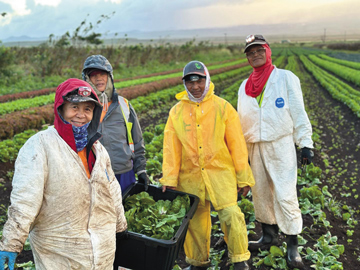
As with all successful and community-minded business owners, Tsutsui found a reason to be helpful with the potato crop. “The silver lining is we donated a large portion of the harvest—which again, only suffered cosmetic damage—to the Hawai‘i Food Bank at the height of the COVID pandemic. The Food Bank then distributed more than 50,000 pounds of these potatoes to the community through direct pick-ups and delivered food boxes.”
Tsutsui, who is thankful “to the entire Maui community for the support of our farm thus far,” understands the importance of the community. “We appreciate the input, patience and help along the way,” he says. “The community plays a critical role in the success of any new venture on-island and we have always tried to incorporate the community’s preferences into our farming operation. For example, early on, we decided that all our crops would be non-GMO. That was a conscious choice based on the community’s feedback throughout the years on that specific topic. We continue to take this approach as we progress toward the complete build-out of our farm.”
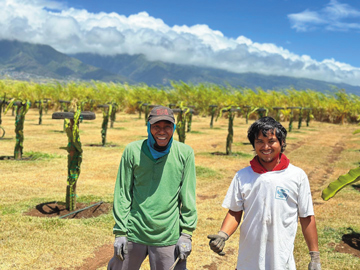
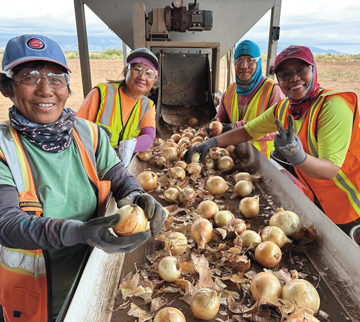
Mahi Pono is also involved in the response to the Lahaina fires. “The Lahaina and Upcountry fires were disasters of historic proportions, and like the rest of our community, our initial response was of grief and shock,” recounts Tsutsui. “However, like the rest of the community, our secondary response was ‘How can we help?’ Our Mahi Pono team worked with the Maui Fire Department to cut emergency fire breaks and operate water trucks on the day of the fires. In addition, the State’s relief effort—led by U.S. Senator Brian Schatz and Lieutenant Governor Sylvia Luke—asked Mahi Pono to oversee and staff the Central Maui distribution center.”
Tsutsui explains the efforts of Mahi Pono. “Over a three-week period, Mahi Pono employees worked with volunteers to distribute water, food, clothes and other supplies to residents displaced by the fires. We also donated watermelons, onions and other food products to the relief effort.”
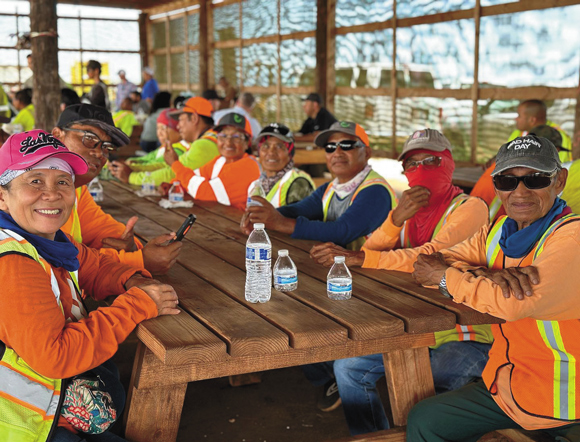
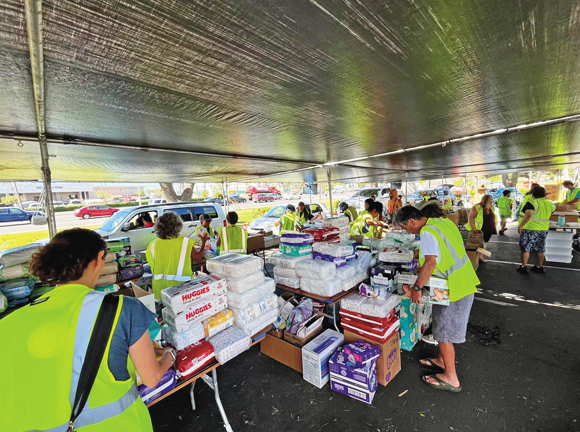
response to the the Fires in UpCountry Maui and Lahaina was first of shock, but the second response was “how can we help,” says Shan Tsutsui, COO of Mahi Pono.
Tsutsui and Mahi Pono continue to have that “can do” attitude and promise to help where needed. “We continue to be engaged with government officials, and we stand ready to help however we can in the coming months and years with the rebuilding process.”
 Alfredo G. Evangelista is a graduate of Maui High School (1976), the University of Southern California (1980), and the University of California at Los Angeles School of Law (1983). He is a sole practitioner at Law Offices of Alfredo Evangelista, A Limited Liability Law Company, concentrating in estate planning, business start-up and consultation, and nonprofit corporations. He has been practicing law for 40 years (since 1983) and returned home in 2010 to be with his family and to marry his high school sweetheart, the former Basilia Tumacder Idica.
Alfredo G. Evangelista is a graduate of Maui High School (1976), the University of Southern California (1980), and the University of California at Los Angeles School of Law (1983). He is a sole practitioner at Law Offices of Alfredo Evangelista, A Limited Liability Law Company, concentrating in estate planning, business start-up and consultation, and nonprofit corporations. He has been practicing law for 40 years (since 1983) and returned home in 2010 to be with his family and to marry his high school sweetheart, the former Basilia Tumacder Idica.
